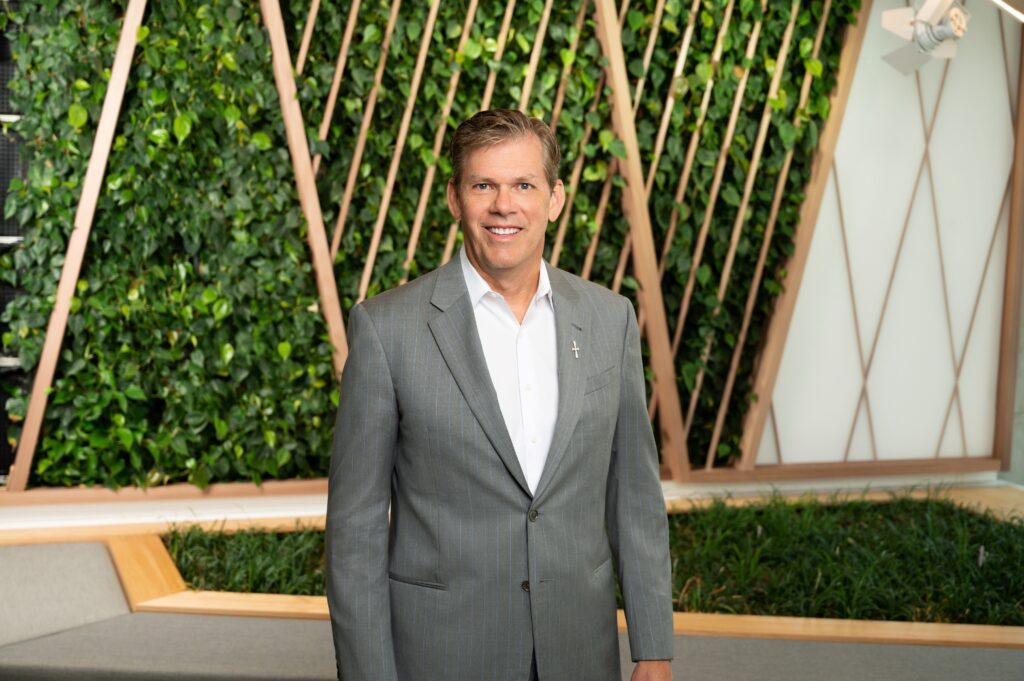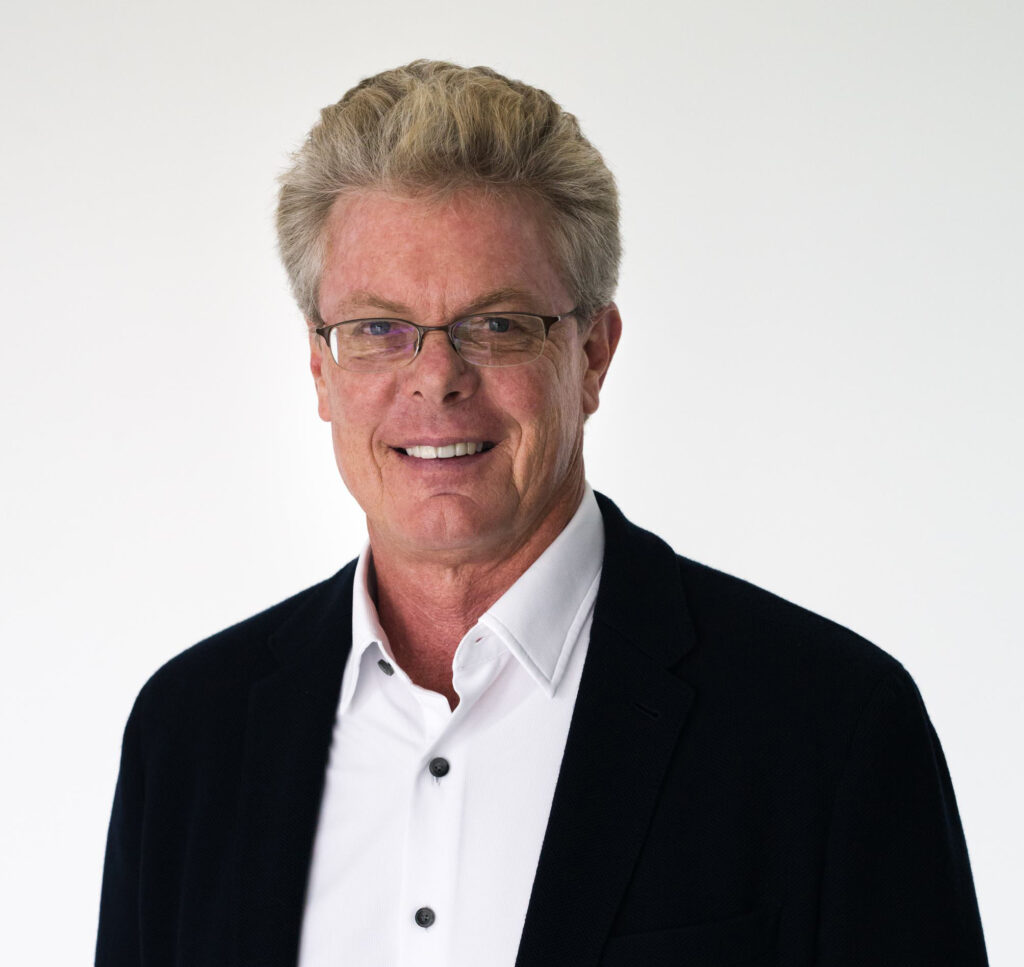Ingredients Matter
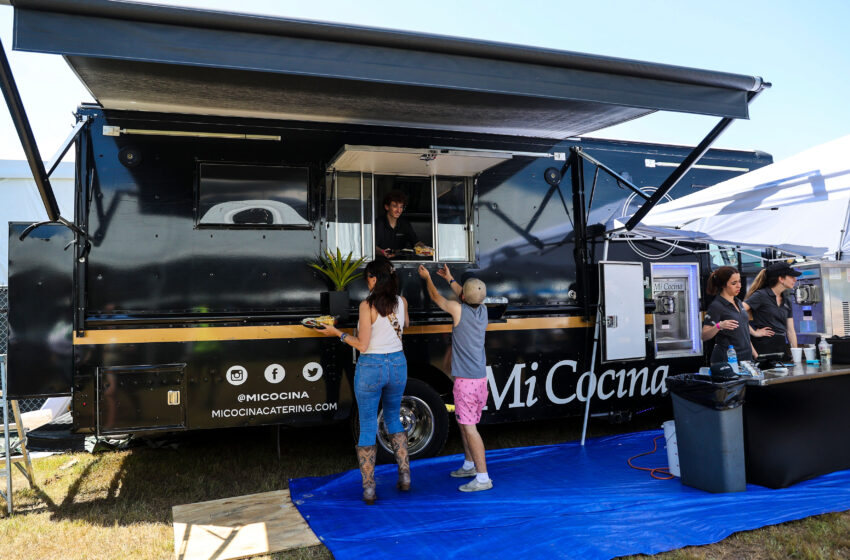
Mi Cocina Food Truck
M Crowd Restaurant Group President and CEO Edgar Guevara focuses on what they do best to overcome challenges.
The backdrop behind where M Crowd Restaurant Group President and CEO Edgar Guevara sits at a Mi Cocina in Dallas is a collage of artwork. This restaurant was recently remodeled, and the original piece of art was much bigger, some 14 feet tall by 5 feet wide. One of his goals when they do a remodel is to leave a sense of familiarity for regular customers to return to.
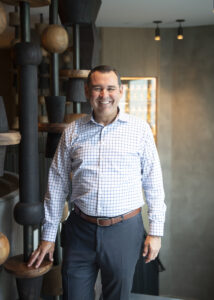
“There’s a favorite table people have,” Guevara says, “and when you remodel a restaurant, you may remove their favorite table, then you kind of ruined it for them. The large piece of art was cut up and converted to smaller pieces of art and put in the bar for those of us who remember it.”
The pandemic was especially tough on the restaurant industry. Industry sales overall were down $65 billion in 2021 from 2019’s pre-pandemic level, according to research released by the Bureau of Labor Statistics and the National Restaurant Association. Industry employees were down one million from 14.5 million in 2019, nearly 7 percent. Nationally, 90,000 restaurant locations are temporarily or permanently closed.
But 2022 has seen a gradual return to normalcy, with restaurant industry sales growing each quarter.
Through the turmoil, M Crowd Restaurant Group continued to grow, opening two new Dallas locations—one in Klyde Warren Park and a new Uptown location on McKinney Avenue—since 2020 through its tried-and-true combination of business ingredients, and Edgar Guevara ensures there continues to be a sense of brand familiarity and continuity for its customers.
Tell us a little bit about your upbringing.
I grew up in El Paso, Texas, single mom, one brother. We’re a small family, and my grandparents lived in Juárez, Mexico. My grandfather actually drove over every day, dropped my grandmother off, went back to work in Mexico, came back, and picked her up. So, it was great for me as he was my father figure. I didn’t recognize the sacrifice he was making to do that every day. He was very focused on ensuring that I didn’t lose the Mexican culture side.
I went to the University of Texas, and it was just too big for me, so I ended up graduating from UTEP [University of Texas at El Paso], which was great because that’s where I met my wife. And that’s where I met a couple of guys in the restaurant business. They owned a Cajun restaurant called Louisiana Kitchens, and I ended up working for them bartending, waiting tables, those sorts of things. The only experience I’d had prior to that was when I started washing dishes in Austin.
We did a couple of concepts together. Then unfortunately, like lots of small businesses, you run out of capital as you start to grow, and I went to work for all the big guys. I worked for Brinker. I worked for Darden. My entire career was spent in operations up until I got here, which served me well. My career in operations has helped me be a much better CEO because all the facets of the business are important. It all starts and ends in a restaurant, at the end of the day.
I remember being a young manager at one of the concepts, and the vice president comes in. He’s with a few other senior guys, and they’re spending time with the general manager running the restaurant. Not one time did they come and say hello or ask for any advice from a handful of us that were in the restaurant, and that left a big impression. I always said that if I ever get the opportunity to be in a leadership role, I’m going to make sure that I get the point of view of everyone involved, especially those who do the job.
That has served me very well.
What was one of the most important lessons you learned in some of those lesser roles, and why was it important to what you do?
The biggest lesson was that most people want to be heard. As a leader, whether you’re running a kitchen or running an organization, listening to people and hearing their point of view and taking the time to try to understand their perspective is important.
How would you define your personal leadership style?
I really believe that creating a great culture and getting people engaged in the cause is super important. Most importantly, people have to be aligned with what you’re trying to do and why you’re trying to do it because there is a lot of hard work along the way.
You mentioned culture earlier when you talked about your grandfather and how he wanted to make sure you knew that part of your family. How have you woven some of your Hispanic heritage and culture into your leadership style?
The Hispanic culture is a very service-driven culture. We’re here to serve others. That example of my grandfather driving an hour to drop my grandmother off to watch [us] as my mom worked, and then going back and coming back—I remember those things, and I try to be of service to people.
So, being of service to others and being genuine—and them knowing that you’re doing it for the right reason—is important because you have to be honest. You have to be genuine. I just turned 55, but my grandfather told me when you shake somebody’s hand, “You look them in the eye, and you tell me you’re going to do it. You do it right.” Those are the things that I really still believe in.
So many smaller restaurants didn’t make it through the closures and the restrictions and the new guidelines that you have to follow. Some of the larger brands did a better job keeping some of the doors open. How did your brand pivot?
As a leader of an organization, you know you’re responsible for the livelihoods of everybody, but not until you’re put in a position where a pandemic comes and you have to think about furloughing people and health insurance—How are people going to eat? How are they going to pay for gas?—not until then do you really realize what responsibility is. But as a leader and taking that responsibility, it gave me a lot of urgency.
When we furloughed people, we paid for everybody’s health insurance, 100 percent. If they needed food, we were there to feed them and anything we could do to help. But I have a great team around me. We’re very nimble.
We turned to online ordering and really ramped it up. We started to create some models around how we could execute that. We brought people back to help us. We quickly jumped on curbside. We quickly made sure we had plenty of people, more people than we needed, so that when you ordered something, we got it to you right away.
Governor Abbott was instrumental in helping us with the to-go margaritas, and the Mambo Taxi to go was a game changer for us.
The Mambo Taxi is a margarita?
Yes, it is. It’s iconic here in Dallas, and the first day we were able to sell them, we sold them by the quarts. We might have sold 500, 600 quarts that day.

We hear Mick Jagger likes them. How did it make you feel that Mick gave you a shout-out at his concert?
There are lots of people who like them, yeah. But Mick Jagger loves them. Obviously, anytime you have somebody like that who talks about your product, it’s exciting. It’s an amazing margarita.
There’s a rule: three’s the limit. Is there a story there?
There is a story. The story is after you have one, you want to do the mambo. After you have two, you need to take a taxi home. And then the third one, there’s no story behind that, but we normally say: three is enough. You’ve got to take a taxi home after the second one; the third one is probably where you need to stop.
Tell us about the Mi Familia Fund and the M Crowd Familia Foundation.
Working for larger companies, they have similar funds, and so we thought that for our 30th anniversary, let’s launch this fund. It has been about a year-long project for us.
We’re all going to contribute through payroll deductions to this nonprofit fund. It’s not managed by M Crowd. It has its own board of directors, and our employees are on it so they can manage the funds. I’m really proud of that because I grew up in the restaurant business, and there are times when you have things that happen that are out of your control and you don’t have any money for it. Although as a company we do that, there are many, many more opportunities where people need money, and they just don’t ask.
But we made it larger. We’re a collection of neighborhood restaurants, and when you say you’re a collection of neighborhood restaurants, you have to take care of things within your neighborhood. You have to make sure that you support your neighborhood cause. So, we opened [Mi Cocina on the Park] Klyde Warren Park up last year, and we donated $50,000 to the park. The money went strictly for free programming. It was important to me that if we were going to be part of this iconic park, that we contribute to things that support children and give them something to do.
We started with this: How do we take care of our own employees, and how do we make sure that they have a fund that they can use or need? And there’s this pillar that says when there are things in the community that we can do to support the community. How do we do that? Then the third leg is: When there are unfortunate situations that happen, how do we get involved and make sure that we help? And so, this little idea turned into this much broader thing.
You mentioned you had to furlough staff and go through some of those pains during the pandemic. How are you incentivizing and retaining employees, training the new ones, and finding people that want to want to work?
Our employees are our biggest asset. We brought back as many people as we could early on, but we also paid them more through the pandemic because tips weren’t there. We had roughly 1,400-1,500 employees pre-pandemic, and we brought back 1,300 of those people.
Our restaurant directors and our multiunit directors all spend time with the new employees. We want to make sure that we embrace them because a lot of times when people join a new company, they’re joining it because they’ve heard something good, or they know somebody there. But what we try to create is trust. If you can get some key leaders in the business to meet these new employees, then they have a sounding board if they have a concern.
But we never deviated from how we did the model; people weren’t having to shift. There are restaurant companies that went to to-go and robots and drones and ghost kitchens and selling this, and I think that’s great for some of those businesses. That’s not who we are.
Coming out of the pandemic, we were in restaurants every day, myself, my CFO, my VP of HR. We were all in restaurants to make sure we were checking in on the pulse of people. It helped us a lot because they had questions and they had some concerns, or they had some fears.
You mentioned tough things. What effect has inflation had on the way you do business, and how are you countering those issues?
It has had a major effect. Wages have gone up. Commodities are out of control. What we’re paying for our ingredients today is significantly higher, in some cases 100 percent higher. We did take a little bit of a price increase because we had to, but we thought we did it in a way that would be fair to the guests and fair to us.
A lot of it is just focusing on the things we can control. We can control the recipe execution, the way we make food, how we take care of our guests. There may be a group of people that maybe came in and used to spend $150 on their visits, and now they’re spending $100.
Every business is going to make less money during this time, unless you do things that potentially could compromise your long-term success. I’m not in a position where I want to compromise on long-term success. We’ll just figure out how to manage the today and make sure that we take care of the people who are with us and dine with us, so that as things get better, we’ll get to see them maybe spend a little bit more money in our restaurants or give us more frequency.
As a CEO, I’ve got to be the one that has to let the board know that “Hey look, unfortunately, this is the impact. Here’s how we’re going to mitigate it, and unfortunately, it just means that this year it might look like this versus like this.”
Those are tough conversations to have, but that’s why I’m in the position I’m in, because it’s my job to not only communicate down to our team but also make sure the board is aware of why we have to do the things we have to do. I’m looking at it as, look, we’re going to get through this no different than we did through the pandemic. We just have to be smart about how we get our way through it.
What’s next for M Crowd Restaurant Group, and Mi Cocina?
It’s taken us four years, roughly, to put ourselves in a position where we can start growing again. I’ve been a guest of this brand and a fan of this brand for 20 years. My kids grew up eating Mi Cocina. I grew up eating Mi Cocina. Now, I get to run the company, and I’ve always thought that Mi Cocina had great lengths to grow outside of Dallas. So we’re starting to put our strategy together to grow outside of Dallas. Texas will probably be the first place that we’re in, Houston or Austin, somewhere here near us so that we can prove it out, but we want to grow Mi Cocina. From a business standpoint, I’d like to double the size of the company over the next 10 years or so if we can, and maybe five years, if we get it right. But we’re never going to grow just for the sake of growing. I have this saying: Sometimes more is not better; sometimes more is just more. We have to be smart about how we grow and where we grow and how we do this.
Is there anything else you’d like to talk about?
The message that I always try to let people know is, this seat is a lonely seat sometimes, because sometimes you have to make the tough decisions. It’s also the best seat because when things are good, it’s easy for people. You really find out what people are about and what organizations are about when it’s tough.
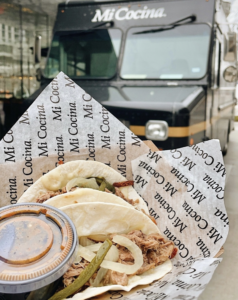
Bonus Section – The Test Kitchen on Wheels
Food trucks are new, aren’t they?
Food trucks started maybe four years ago. I have this really interesting approach to doing things. Sometimes, you just do it because the one challenge with really large companies is you have to prove ROI on everything. Sometimes, there are great ideas that don’t make it to the table because everybody is worried about “Is it going to pay off in a year or two years?” or whatever the numbers are.
But the food truck idea really started from—we don’t have a test kitchen in our office. And so I said, “Well, let’s build one.” And then we said, “Well, let’s build a food truck and then we’ll get our chef. We can drive around town and give people food.”
But I wanted a margarita machine on the outside because of the Mambo. You can’t have a food truck and not have margaritas on it.
Then it went on to, “Hey, if this thing drives around town, it’ll be a moving billboard,” but we really did it with the intention that it’d be a food truck or our test kitchen. Never once has it been a test kitchen.
Now, we’re on truck number four. We use them in the traditional sense, where they all show up at an event. Like, we’re at the Perot Museum of Nature and Science every Thursday. We sell margaritas and we sell some nachos. But most of the time, they’re at somebody’s house. We do full-service events where the food truck pulls up and you come get margaritas at the truck. And, we serve fajitas to you.
Then during the pandemic, they really helped us and helped our communities. We used them to feed neighborhoods. We would call a neighborhood association and say, “Hey, we’re going to be in the area on Thursday. If you’d like to have margaritas and fajitas, have everybody fill out this form, pay ahead, and we’ll show up at 7:00. We’ll give everybody their food.”
So this kind of test idea has become kind of a separate business on its own now.
That’s the Dallas area?
Dallas-Fort Worth. We drove them up to Oklahoma. Troy Aikman had a concert out there benefiting Henryetta, Highway to Henryetta, with Blake Shelton. We drove the food trucks up there to support Troy and his cause.
Sometimes it’s just the right thing to do. Those trucks have allowed us to do a lot of different things.
Helped with your nimble pivot?
It allows you to introduce things because there are times we can play with different things on the truck that you might not try in the restaurant. So it has allowed us to figure out how we really take care of our core guests in many ways—not just in the restaurant.
Lightning Round
Favorite Texas product?
Brisket tacos, Mi Cocina. The Mambo Taxi. Both together.
What does your morning routine look like?
I wake up, have a cup of coffee, and then I do some sort of exercise, whether it’s the Peloton or go for a run. I take about 45 minutes in the morning to do “Edgar time.”
What is the best advice you ever got?
Best advice I ever got was: Make sure you really listen to what people have to say.
What would surprise people to know about you?
I played the cello in high school.
What’s your can’t-live-without-it technology?
I guess it would be my iPhone. It’s a lifeline, right? I’m still a talker on the phone, but my wife and kids text. I won’t respond to them because I’m a believer if you think something’s important, call me.

